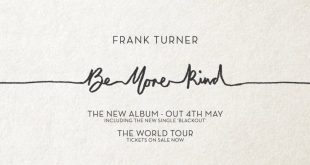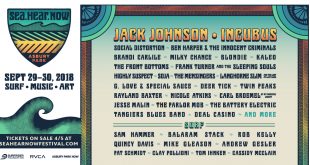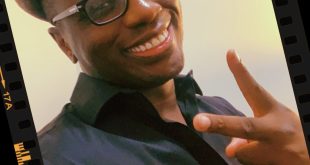England’s Frank Turner and his band Frank Turner and the Sleeping Souls have found significant success in the UK, with 3 albums charting in the top 5 in the last 5 years. In the United States he has found a second home in the city of Boston, MA. Last week Turner began a six show residency at Boston’s Royale. We got a chance to sit down with Frank before the 2nd of 6 shows.
[Editor’s note: Interview and portraits done in collaboration with Elizabeth Wiltshire (http://www.elizabethwiltshirephoto.com/)]
Music Existence: For starters, I know you have a really special relationship with Boston. What is it about Boston that really makes you feel at home?
Frank Turner: I guess I should ask “What is it about me that Boston seems to like?” [laughs] But, I mean, when we first started touring the U.S., Boston was a city that we hit, and then I think I’m right in saying that there’s a radio station called WFNX that was like closing down and they started using “I Still Believe” as their sort of rallying cry, and that kind of started kicking things off. And then we got on tour with the Dropkick Murphys, which is sort of like being given-sort of like being knighted in the city [laughs]. And, you know, we did like a St. Patrick’s Day run in 2012 in and around Boston, we did like five shows that week in Boston. Afterwards it was kind of like “Yeah, cool, Boston’s home now.” But it’s great, it’s where we play our biggest shows in the U.S.A., it’s where we get the best welcome, and we love it. This residency- last time we were in Boston we did the Agganis show, which was really cool, it was really fun, but it’s just kind of like we could have just come back and done the Agganis again, but it was like “Fuck it, let’s do something slightly different.” And here we are!
MusicExist: It’s more fun in an intimate setting, do you still get a chance to do that back home?
FT: Yeah, sometimes, sometimes. I mean, the problem I have— the “problem”, that’s a ridiculous word— the thing for me is just that like, my choice of venues and all that kind of thing is all about the accessibility. Because, like, to pick an example, I remember when I was a kid there was a day when Rage Against the Machine announced a show at the Astoria, which is 2,000 capacity, which is ridiculous. I didn’t get tickets because I wasn’t cool, I wasn’t in the know, and I didn’t live near the venue, I didn’t know the right people. And suddenly the whole thing became quite exclusionary, you know what I mean? And it’s like I like to think that 14 year old me would be able to get a ticket for my shows, wherever we’re playing, you know? So that’s the thing, it’s kind of like we could play a cool—we could play a venue this size of London easy and it could sell out in five seconds and 90% of the people who wanted to come wouldn’t be able to come. And that would shitty. And that’s the cool thing about this run, is that the first show sold out super fast, but there’s five others, as as far as I can tell, everybody who wants to come is able to come.
MusicExist: Yeah, and there’s a lot of problems with the ticket scalping for stuff like that.
FT: Yeah, totally, and that’s the other thing. You’ll end up in a situation where all the people start scamming money off of what you do and fucking over fans in the process, and neither of those are particularly things I’m interested in supporting. [laughs] But it’s funny, like the punk rock thing to say is that “Yeah, it’s cool we’re playing to smaller rooms,” and obviously that’s true, anybody who’s played a big area show and doesn’t tell you that it feels amazing walking out on the stage is a liar, you know? [laughs] It’s like, walking out in front of all those people is a fucking great feeling, and it’d be ridiculous not to acknowledge that. I think that both environments have their attractions, you know what I mean? There are things that you can do and there are sort of gestures you can make in an arena environment that you can’t really do at a small show. But here it’s like I can see everyone in the room, you know what I mean? I can make eye contact with every single person in the room. And that’s pretty cool too. I can sweat on the front row if they don’t mind too much. [laughs]
MusicExist: Yeah, and that’s what my next question was going to be, how do you approach them differently, like a club show versus a bigger show?
FT: It’s funny, because there are differences, most of which have to do with the size of the actions that you make, you can’t really make a little joke and a head nod in the area and have everybody get it, you know? It’s like the people who are in the oxygen-starved seats are like “What did he just do?” [laughs] you know what I mean? Which is rubbish! So, there are differences like that, I mean, at the same time, this is perhaps a more of an idealogical and impractical setting— when we first started doing bigger shows in the U.K. I went through this phase of thinking “Oh, now we have to completely change what we do because it’s a new environment.” And actually, I don’t think that’s true. We’re still— it’s me and my guys and we get up and we play the songs I’ve written as best we can in a way that’s engaging. And that, that remains the same regardless of whether you’re playing in front of 100 people or 10,000 people.
MusicExist: And how do you go about putting a setlist together for something like this? I know you change it up a lot anyway, but when you’ve got six nights, you don’t want it to be the same every night.
FT: So the setlists for this run have been like, you know when you’ve got something on your to do list that’s sort of so awful you just sort of push it back like “Agh, no, I’ll think about it later!” [laughs] Just because like, we just finished the tour, we don’t play the same thing every night but generally speaking, over tour the setlist evolves, that has the same kind of staples: same opening three, same closing three. And there will be a revolving new song slot and a revolving kind of obscure song slot. And this is the thing—I should add, by the way, I spend an unhealthy amount of my life thinking about setlists. Really, I should get out more. [laughs] It’s because there’s more than one type of person that comes to a show, there’s the kind of person who comes to one of my shows every two years, and they want to see the hits, you know what I mean? And then there are people who’ve been to nine shows on this tour already and they’re like, “Oh, cool, you’re playing ‘Recovery’ again…” And it’s quite difficult to keep both groups of people happy. And, actually, there’s a lot more of the former group than there is of the latter, but at the same time if somebody comes to a show on a tour nine times I feel like I owe them the duty of a kind of care. So, balancing it out gets quite difficult, and then basically tonight’s been the first difficult night because last night we just did the standard tour setlist that we’ve been playing, and tonight’s when we’re like, “Okay! Let’s do something else!” And, I’ve written a lot of songs and a fair few of them are popular enough with my audience that we can happily dump them into the set. And I suspect that by the time we get to night five I’m going to be like, tearing my hair out. If somebody’s only coming to night five, to me, it’s like, “Oh cool, here are nine songs you’ve never heard before!” and they’re gonna be like, “Oh, cool, fuck this.” [laughs] So, you know, it’s always that balancing act. But, you know, it’s going well now. We’ll see how it goes. But I’m excited about tonight, actually, because it is kind of fun to be playing a radically different setlist because you get into the rhythm of playing the same set, but at the same time, there’s the flip side of that is that you can get sort of lazy, you know what I mean? Tonight’s the night—I mean, like last night, I didn’t have to look at the setlist because I knew what was coming next. Tonight, I’m gonna be looking at the setlist a lot, because I don’t know what the fuck is going on. [laughs]
MusicExist: So, I know you’re playing your full album “Love Ire & Song” on the sixth night, why’d you pick to do that one?
FT: Well, so this year is the ten year anniversary of it coming out, and we did one show at Lost Evenings Festival 2 in London back in May, which is now sort of rolling as a thing which is kind of cool, we’re gonna do it every year. So, the first year we did the ten year anniversary of my first album, this year is the ten year anniversary of the second album. And obviously there are people in the U.S.A. who didn’t see that because it was in London, so we thought it would be a fun thing to do again. It was really awesome playing that album in full. When we made that album, my ambitions for it were to maybe try and play to 200 people a night rather than 50, or 100, you know what I mean? And now, I’m in Boston, a city I’d never been to when I wrote and recorded that album, talking about a ten year anniversary. That’s cool as fuck! And yeah, it’s kind of nice to be able to stand on the stage and say, “I did some shit when I was 25, and here it is.” And people still care. That’s kind of a nice thing to say in your mid- to late-thirties.

MusicExist: So, for the new album, you went in more of a political direction, but it’s not like it’s over-the-top political. Was that something that you set out to do, to make a record like this, or did you just start writing and it came to you?
FT: Yeah, I try to write in a sort of undirected way, I try to just like—and this sounds quite hippie-ish, [laughs] I just try to let things come in a matter of their own choosing. And I’ve had a few moments in my life where I’m just like, “I’m gonna write a soul record!” or this kind of record and everything ends up feeling forced to me, and I’d rather just let the songs arrive. So, clearly, I was sort of—well, I don’t think any sort of thinking-engaged adult could have lived through the last three, four years without having something to say about it. But it’s kind of funny, like I’ve been sort of arguing about whether I think this is a political record, not because I have a problem with the concept of political records, that’s fine, but it’s evidently not a Rise Against album. [laughs] You know, it’s a social record to me, it’s about how we interact with each other as people. And one of the other things is that, and with all due respect to my friends who write political songs, to write fist-pumping anthems about politics, you have to be extremely sure that you’re right, you know what I mean? [laughs] Like, doubt doesn’t really come into a Rage Against the Machine song. And like, the older I get, the overwhelming feeling I have about politics is doubt. And certainly, I would say that the last three or four years has seen collapse of nearly every political certainty that I thought was a given. And in some cases, maybe that’s a good thing. But in some cases, it’s evidently a bad thing as well. And I’m confused, and I’m scared, and I wanted to write a record about that. And I’ve given it a go trying to write some fist-pumping anthems about like, “I don’t really have any idea about what the fuck is going on!” [laughs] Which is, uh, possibly a new genre. [laughs] But also, in a funny way, and it’s important to phrase this correctly—it’s sort of supposed to be a nonpartisan record, which sounds like a contradiction of terms in some ways. But also, in saying that, it’s important to say that doesn’t mean I don’t have any opinions, of course I do. But the record is about how we conduct the arguments that we have, and not about what the contents of those arguments are…for the most part. There are obviously a few moments where I put my money down. But, I wasn’t really interested in writing a record that says, “I think the Supreme Court should do this!” you know what I mean? Because I think that’s a slightly ludicrous thing to do with a song. I don’t think that rock and roll music is a particularly appropriate format for policy suggestions, you know what I mean? Whereas, I do think that the suggestion of intellectual humility and consideration is an appropriate ambition for music to discuss. And the area of the world that I have control over is my shows, and I can at least try to exert some power and therefore if I’m going to use that, I’d like to use it for people to walk out of shows trying to be a little more considerate to other people’s ideas. That seems—I can do that.
MusicExist: Yeah, and making it a nonpartisan kind of thing is good, because a lot of people aren’t doing that now, a lot of people come out like super, “This is what I believe, and you better believe it too.”
FT: Yeah, and I think there’s a place for that, like when I wrote my song “Make America Great Again”, a lot of my English fans said, “Well, it’s not really all that provocative because your shows are just gonna be full of Democrat voters,” to which I said, “I don’t think that’s true.” And in a funny, odd way, I’m kind of proud of that fact, because I do want to play—well, the reason I use the words “folk music” to describe what I do when I started out was it was as much idealogical as it was musical. It was about ideas, it was music for everybody. So, I’d like to have a broader cross-section of society at my shows. Also, I think that the worst reaction to moving to a partisan point is that if we think voting for Donald Trump is a bad idea, then the worst thing you can do is told everybody who did that that they’re a fucking retard. Because—oh, that’s a terrible word and I shouldn’t have used it. But, they’re just gonna go like, “Cool, we’ll do it again.” And to stray into an actual political comment here, I think the Democrats are kind of doing an absolutely terrible job in this country, I think that Donald Trump is on track to win another election if he chooses to do so. Because, precisely nobody on that side, on the Democrat side of the aisle, seems to have learned the lesson of what happened in the last election. And I think that’s appalling! I can’t be more enraged or shocked about it. There’s precisely zero attempt to reach out to the middle ground Republican voters, and that should be the only thing the Democrats are doing right now, because it strikes me as important to make sure that fucker doesn’t get elected again, call me crazy! [laughs] And veering very extremely left seems like, from a matter of practicality and pragmatism, seems like a very bad idea to me.
MusicExist: Yeah, and it creates more division and people will just be like, “Well, I’m gonna stick to my guns.”
FT: Yes, completely! And often, quite literally guns. [laughs]
MusicExist: I also wanted to ask you, obviously right now mental health is a big thing, how do you go about taking care of yourself on the road?
FT: Well, not always with 100% success. [laughs] And I would say with a hard-won skill set, one of the things that in retrospect—I’m 36, which is not particularly old in the grand scheme of things, but in the context of touring, I’m certainly reaching the upper end of the standard demographic of touring musicians. And looking at it now, when I started out, there were just no adults in the room, you know what I mean? It was just people my age in the room piling into a van and going, “Fuck it!” and then driving around the country and then all around the continent playing shows, and in some ways it was cool and it was punk as fuck and really exciting. But I think that it’s easy to romanticize a lot of aspects of touring, but if you sort of strip away the bravado of touring you’re talking about a bunch of people just living extremely damaged, unhealthy lives. Yeah, and there were no adults in the room, you know? To the extent that I’m able to do this anyway, if we’re touring with younger bands and if I can impart any information to them, just like, “It’s okay to sort of chill out sometimes!” Like, this isn’t a bachelor party, it’s a journey. And that’s the thing, I’ve spent 20 years of my life in an environment in which alcohol is considerably more readily available than food, or indeed shelter. And for me, that has led me to some pretty disastrous periods in my life. But I’ve got into this new habit, I only drink if I’ve got a day off the next day, I’ve kicked my substance habits—touch wood again—and I’m quite proud of that, quite happy with that. But it’s been hard, it’s hard work.
ME: I was also going to ask about the World Cup too, what you think of England’s win?
FT: Oh, see, when I was in school, there was one large group of kids who were into football and there was one small group of kids who was into punk rock, and the larger group of kids would beat up the smaller kids every fucking weekend for the first ten years of my life or something, so I didn’t give a fuck about football. And I aggressively still don’t give a fuck about football. [laughs] But it’s funny, I’m sure sure there’s quite one sport over here that occupies quite the amount of social role that football does in the U.K., it’s like baseball, American football wrapped up together kind of thing. And my experiences as a kid were just big, thuggish pricks hitting me if I answered a question wrong about which team I supported, so fuck football and fuck the culture surrounding it. [laughs] There we go. Sorry. Well, actually, hold on. Let me backtrack and say that as I’ve got older, it’s an interesting part of our national culture for a lot of people who didn’t have that experience as a kid, and Matt, who plays the keys in my band, is a huge football fan, and he follows football religiously, and that’s cool! Good for him. You know, cultural interest, if he’s into that, that’s totally fine. Just don’t force it on to me, so yeah. Fuck football. [laughs]
ME: Finally, what are some goals for the rest of 2018?
FT: Um, to make it through tour without going insane or dying. [laughs] Actually, one specific one, I wrote a book a few years ago about touring and I’m writing another book which is about songwriting, and I am about to miss my deadline. [laughs] So, I in fact this morning sent a begging letter to ask for an extension. So, one of my others is to finish that fucking book! At least the first time around, the first time I was writing a book, I went into it with this large degree of hubris, because I’ve written magazine articles plenty of times, and I was like, “Well, a book’s just twenty of those! It’s not gonna be a problem!” And then, of course, I immediately entered this realization of how wrong I was about that. And, may I add, I have a lot of friends who are journalists and they were going, “Fucking hell, well done!” So, I’m about halfway through my first manuscript, I have 35,000 words to get through, which is quite a lot of magazine articles! [laughs] But, I mean, it’s getting there. It does have to legally be done by mid-September now, so yeah. Hopefully I’ll get to the end of that soon.
 Music Existence Because of Music, We Exist
Music Existence Because of Music, We Exist




